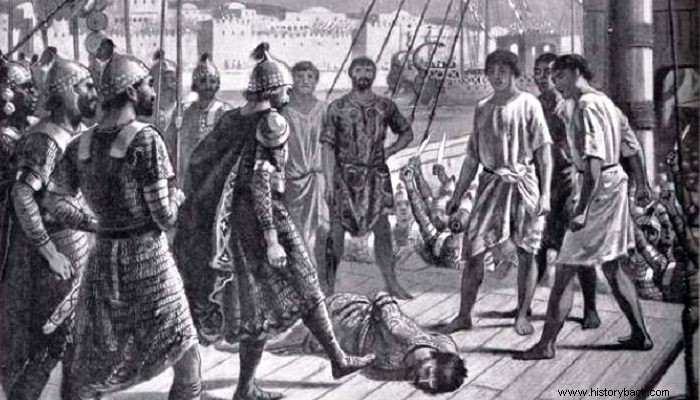
Flavios Fokas was a special case of man in the negative sense. He was a low-ranking army officer who rebelled against Emperor Maurice, whom he destroyed along with his entire family to become emperor. From there on, he began his destructive work for the state, which fortunately did not last long.
Little is known about the life of Phocas before his stand against Mauritius. He was born in the middle of the 6th century. probably in Thrace. In 602 AD the Byzantine army on the Danube mutinied due to fatigue and wage cuts. Phokas took advantage of the opportunity and was proclaimed emperor.
At the end of the year he entered Constantinople without resistance. Maurikios was arrested and brutally executed. Gradually, all the members of the former emperor's family were murdered, including the wives of his sons and daughters.
Phokas, despite the extermination of the imperial family, did not feel secure on the throne. For this he unleashed an unprecedented wave of terrorism against real or imagined opponents. Against the external enemies of the state, however, he proved much less dynamic. Avars and Slavs threshed, literally, in the Balkans and Sassanid Persians in the East.
In 603 AD the Persians conquered large areas in Asia Minor. This situation pushed the commander-in-chief of the East, Narses, to rebel. Phokas promised him amnesty, but when he fell into his hands he threw him alive into the fire. In the meantime the Persians reached the Bosphorus.
Phokas, not having confidence except in the members of his family appointed to the highest offices his brothers Domengiolo and Comediolo and his nephew - also Domengiolo - who proved to be equally incapable of repelling the enemies. On the contrary, they were very successful against the citizens...as well as the so-called "untimely prince", the general of Vonosus which in the Jerusalem area alone slaughtered over 10,000 rebel citizens.
Phocas, incompetent as he was, scattered the riches of the empire which Mauritius had gathered with bloody savings, bestowing them upon his friends or upon those whom he expected to support. He even went so far as to recognize the primacy of the Pope of Rome over the Patriarchate of Constantinople.
This destruction could not continue and members of the Byzantine aristocracy led by Phokas' son-in-law general Priscus called upon the Exarch (commander) of Africa Heraclius to overthrow Phokas' tyranny. Exarchus assigned the mission to his son Heraclius and his cousin Nikitas. Heraclius the Younger led the campaign against Phocas in Polis, while Nikitas was liberating Egypt and Palestine.
Heraclius arrived in the city at the beginning of October 610 AD. Phokas was abandoned except for a few of his followers. An attempt to attack Heraklion's fleet was repulsed in a naval battle at Keratio and a few days after Heraklion he entered the city in triumph and was crowned emperor.
Fokas and his relatives got what they deserved . However, the state of the Empire he left behind was tragic. It took long struggles and much blood to restore as much of the Empire as possible.
